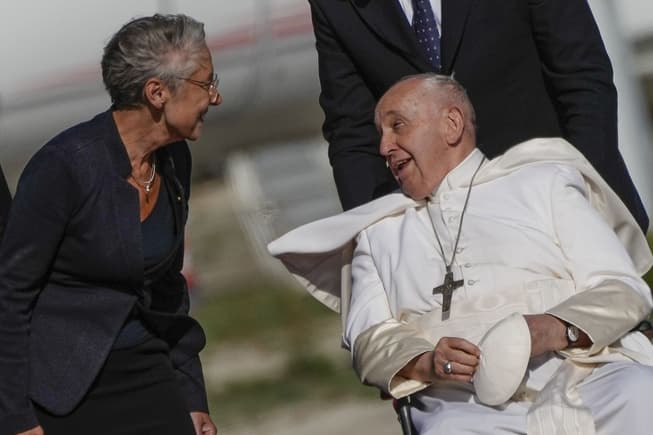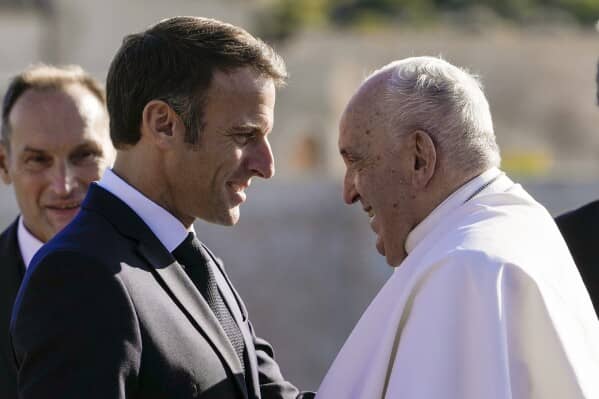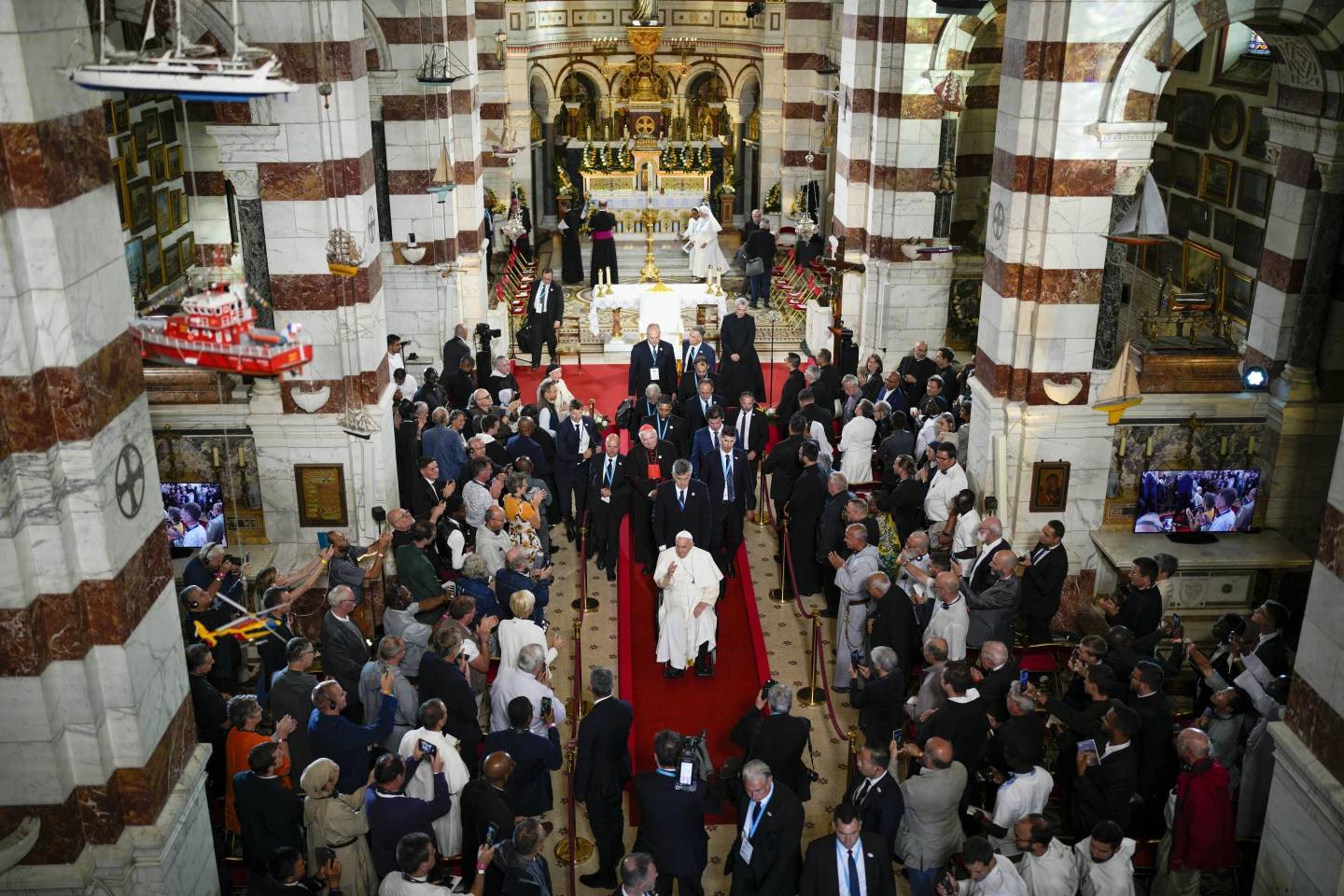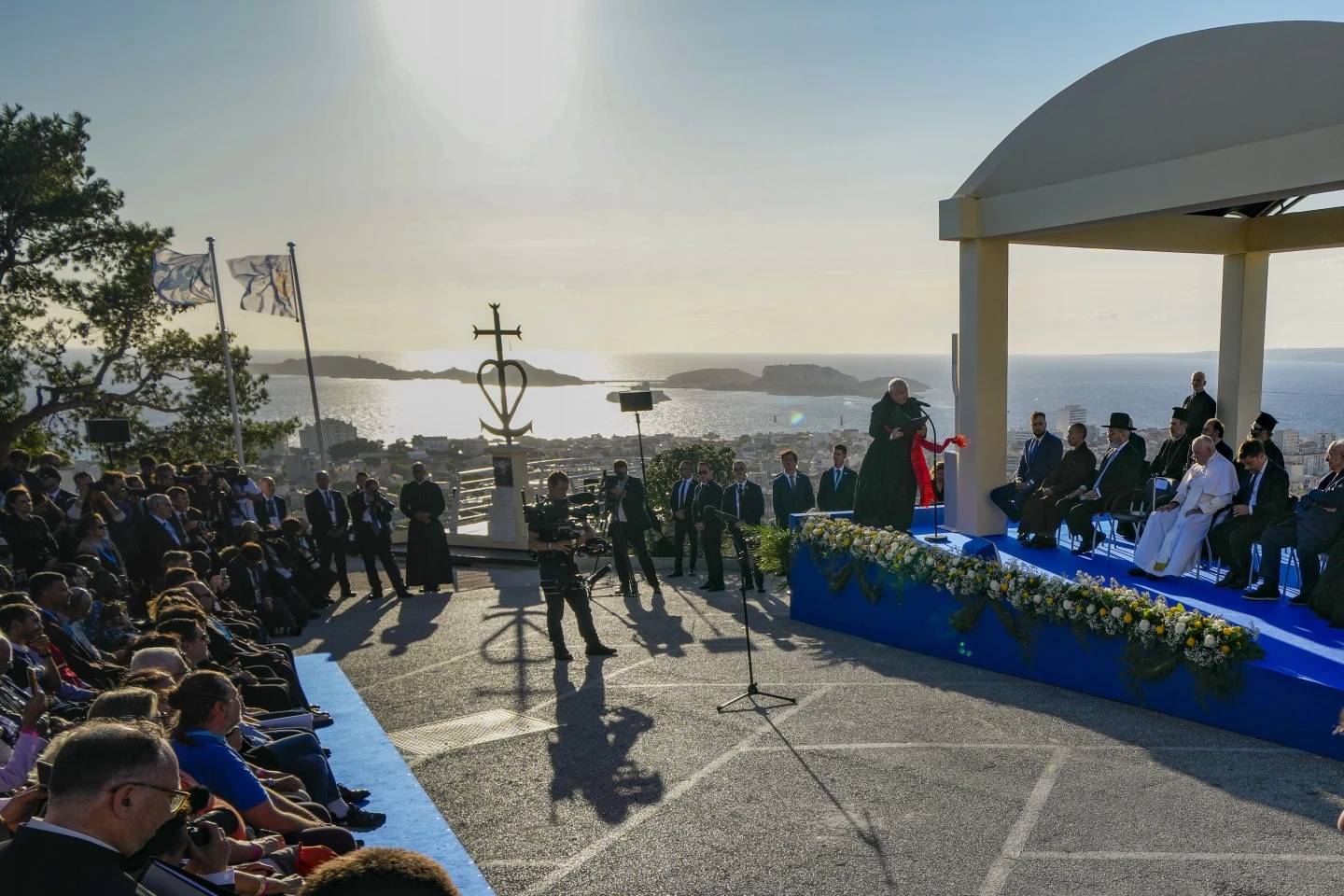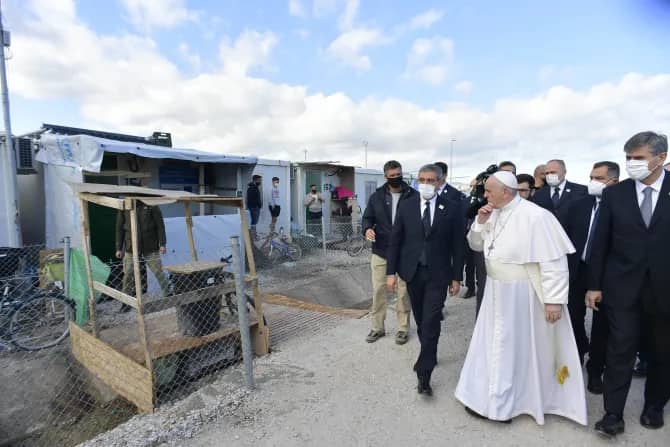ROME – Since Pope Francis in July 2013 first visited the small Italian island of Lampedusa, a primary destination for migrants seeking entry in Europe, the issue of migration has been a cornerstone of his papacy.
Ten years later, arriving in the southern French city of Marseille, Francis again put the issue back in the spotlight, holding a memorial alongside leaders of various faiths for migrants and sailors who have died at sea, condemning some of Europe’s strict anti-migrant policies and insisting on an approach of solidarity that respects human dignity.
“We cannot be resigned to seeing human beings treated as bargaining chips, imprisoned and tortured in atrocious ways; we can no longer watch the drama of shipwrecks, caused by the cruel trafficking and the fanaticism of indifference,” the pope said during the memorial.
He issued a direct critique of policies by several EU countries, including Italy, which fine vessels that rescue migrants and prevent them from docking, saying, “People who are at risk of drowning when abandoned on the waves must be rescued. It is a duty of humanity; it is a duty of civilization!”
God will bless humanity, he said, “If on land and at sea we know how to take care of the weakest, if we can overcome the paralysis of fear and the disinterest that, with velvet gloves, condemns others to death.”
Pope Francis is making an overnight visit to Marseille for a third edition of the Rencontres Méditerranéennes, or “Mediterranean Meetings,” following similar gatherings of political and ecclesiastical leaders in Bari in 2020 and Florence in 2022.
The largest city in southern France and an important commercial base for the Mediterranean, Marseille is known for its multicultural character, a dynamic that organizers have said gives the city great potential in helping to unite people of different cultures, languages, and traditions.
The Rencontres Méditerranéennes has drawn some 60 representatives of churches from the five shores of the Mediterranean Sea, and around 60 young people from the same areas to discuss the current political, economic, and environmental challenges of the Mediterranean region.
Of the various topics to be discussed, including the environment, poverty, and violent conflict, migration is expected to loom largest.
Through visits to primary migrant arrival points, such as the Italian island of Lampedusa, Cyprus and Greece, including two visits to the Greek island of Lesbos, Francis in his decade-long reign has made migration a key priority of his papacy.
In a sign of how prominent the issue of migration will be during the brief visit, Canadian Cardinal Michael Czerny, prefect of the Vatican Dicastery for Integral Human Development and the pope’s primary point man on immigration, is traveling with Francis.
The visit takes place against the backdrop of a spike in tensions within Europe on the issue of migration amid a surge of new arrivals.
In a decision the pope almost certainly will discuss with French President Emmanuel Macron, France last week ordered the number of soldiers at its border with Italy to be doubled in a bid to crack down on illegal crossings, as Italy faces a massive spike in migrant arrivals by sea from North Africa.
Germany also decided to suspend a voluntary agreement with Italy to take in migrants, accusing the Italian government of failing to live up to its obligations under the EU’s Dublin Regulation, which outlined criteria for which EU states are responsible for examining an asylum request.
In July, EU Commissioner Ursula Von der Leyen, Italian Prime Minister Giorgia Meloni and Dutch Prime Minister Mark Rutte signed a pact with Tunisia aimed at stemming the flow of migrants from Tunisia into Europe, which had become one of the preferred routes for smugglers in Africa, given that Libya is now considered too dangerous.
So far this year, around 127,000 migrants have arrived in Italy, almost double compared to the same period last year, with over 2,000 people having died this year in their attempt to cross from North Africa to Italy and Malta, according to the UN migration agency.
Last week alone, 8,500 people arrived to the Italian island of Lampedusa, numbering more than the island’s entire population, in 199 boats, according to the UN migration agency. The Italian Red Cross, which runs the island’s overflowing migrant center, said that 1,500 migrants stayed there despite only having a capacity for 400.
Speaking to journalists on board his flight from Rome to Marseille, the pope said the current situation in Lampedusa is one of “a terrible lack of humanity.”
When shown a photo of a small child who arrived in Lampedusa with its mother last week, the pope said, “They keep them in Libyan lagers, or they throw them into the sea.”
On the message he is expected to deliver, he said, “I hope I have the courage to say everything I have to.”
Pope Francis’s visit to Marseille also takes place just two weeks ahead of his publication on Oct. 4, the feast of his namesake, St. Francis of Assisi, of a new exhortation on the environment, which he has said is an update to his 2015 eco-encyclical Laudato si’, offering current data and evaluating the progress made since Laudato Si’s publication eight years ago.
In his address at the memorial, Francis said the sea is meant to be a source of life, yet is now for thousands a place of death, and he offered a moment of silence for those who have died in their attempt to cross the Mediterranean.
“Let us not get used to considering shipwrecks as news stories, and deaths at sea as numbers: no, they are names and surnames, they are faces and stories, they are broken lives and shattered dreams,” he said.
Pointing to “so many brothers and sisters drowned in fear, along with the hopes they carried in their hearts,” he said that “Faced with such a drama, we need deeds, not words.”
He repeated his frequent lamentation that the Mediterranean has become “a huge cemetery” and said it is also “the ultimate rejection” of those who flee poverty, conflict and environmental disasters in search of better circumstances.
Francis again pointed to the book Fratellino, meaning “little brother,” recounting the story of a migrant who travels from the Republic of Guinea to Europe in search of his brother, and who in the story calls the sea a crossroads between life and death.
“We too are at a crossroads: On the one hand, there is fraternity, which makes the human community flourish with goodness; on the other, indifference, which bloodies the Mediterranean. We find ourselves at a crossroads of civilization,” he said.
Religious leaders must set the example of fraternal solidarity, he said, noting that the Biblical figure of Abraham was called to leave home and travel to a foreign land, where he welcomed strangers and foreigners into his tent.
“At the roots of the three Mediterranean monotheistic religions is hospitality, love for the stranger in the name of God,” he said, saying this welcome is essential if “we dream of a prosperous future.”
Believers, then, must be “exemplary in mutual and fraternal welcome,” he said, noting that often relations among various religious communities are not easy, “with the woodworm of extremism and the ideological plague of fundamentalism that corrodes the authentic life of communities.”
Pope Francis noted that Marseille is characterized by great religious and cultural pluralism, and in this sense, the city itself “stands at a crossroads: encounter or confrontation,” he said, and thanked all those who assist migrants and promote their development and integration.
As religious leaders, “We look to the pioneers and witnesses of dialogue,” he said, saying, “You are the Marseille of the future. Go forward without discouragement, so that this city may be for France, Europe and the world a mosaic of hope.”
He quoted David Sassoli, an Italian who served as president of European Parliament from 2019 to 2022, and who during a previous Mediterranean Meetings event in Bari in 2020 said that both believers and non-believers alike “need to rebuild that house to continue together to fight idols, tear down walls, build bridges, and give substance to a new humanism.”
“To look deeply at our own time and to love it even more when it is hard to love is, I believe, the seed sown in these days when we are so attentive to our destiny. Stop being afraid of the problems that the Mediterranean subjects us to…For the European Union and for all of us, our survival depends on this,” he said, quoting Sassoli.
Pope Francis closed his speech urging those gathered to face current challenges together, saying, “let us not cause hope to shipwreck; let us together make a mosaic of peace!”
Prior to the memorial, Pope Francis held a moment of prayer with diocesan clergy and religious inside the city’s basilica of Notre Dame de la Garde in which he called Marseille a “veritable meeting point of peoples” and urged the church’s pastors to bring God’s closeness to everyone the meet.
He also urged them to intercede, bringing their people’s needs to God, thus becoming “bearers of mercy” to the world.
“Let us open the doors, not only of churches and rectories, but especially of the heart, to show through our meekness, kindness and acceptance the face of our Lord,” he said, saying, “Whoever approaches you must not find aloofness or judgement, but the testimony of a humble joy, more fruitful than any display of ability.”
In a greeting to Pope Francis at the memorial, Cardinal Jean-Marc Aveline, the archbishop of Marseille, who in the past has stressed a balanced approach on migration, noted that the Mediterranean, “so beautiful and peaceful, can also become, we all know, a cruel cemetery.”
“When men, women and children, who know nothing about navigation, who flee from poverty and war, are robbed of their goods by dishonest traffickers, who sentence them to death by making them board old and dangerous boats, this is a crime!” he said.
Aveline also took aim at policies forbidding rescue ships to save migrants stranded at sea, saying that “when political institutions prohibit non-governmental organizations, and even ships that cruise in these waters, from rescuing shipwrecked people, it is an equally serious crime and a violation of the most basic international maritime law.”
He thanked the pope for his defense of migrants and refugees, beginning with the pontiff’s visit to Lampedusa in 2013.
“Now we would like to gather together, thinking of those faces of women, men and children who every day and perhaps even tonight fight to survive and hope to find help,” he said.
In an impromptu addition to his prepared remarks, Francis encouraged those involved in seaborne rescue efforts.
“I see here many of you who go out to sea to save people, to save migrants, and who many times are forbidden from going,” he said. “These are acts of hatred against brothers and sisters. Thanks for what you do.”
Follow Elise Ann Allen on X: @eliseannallen
